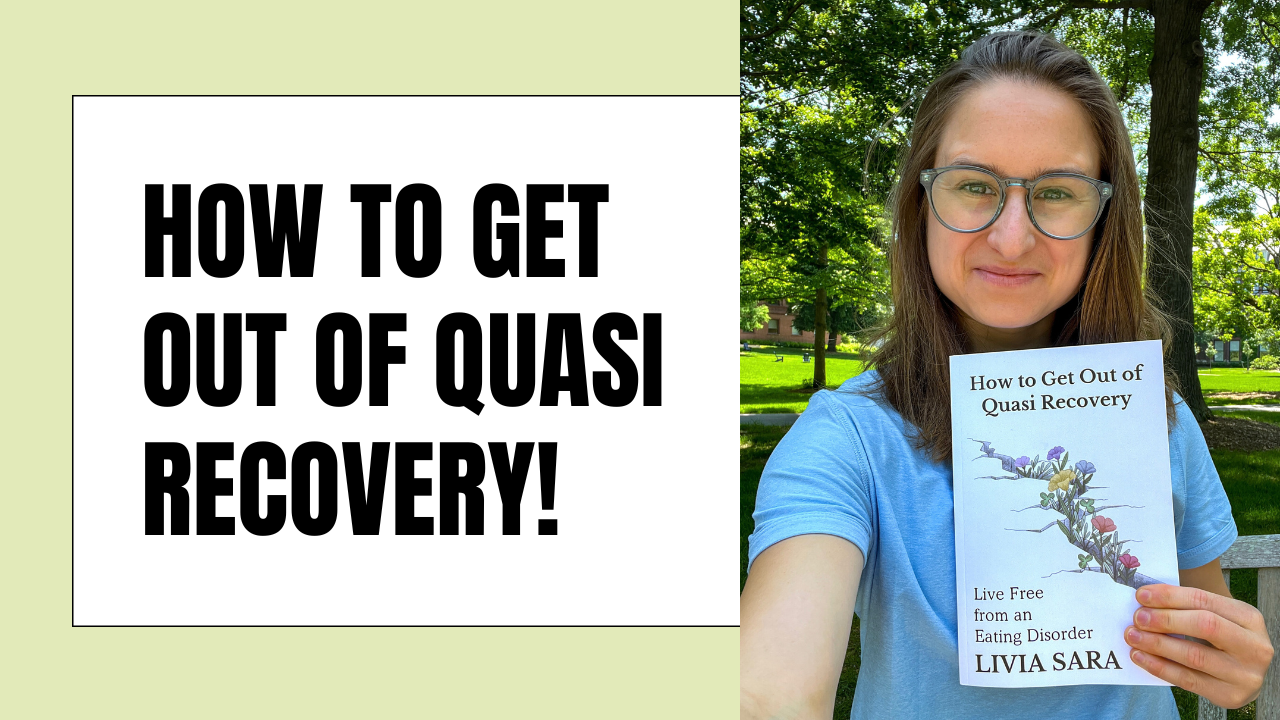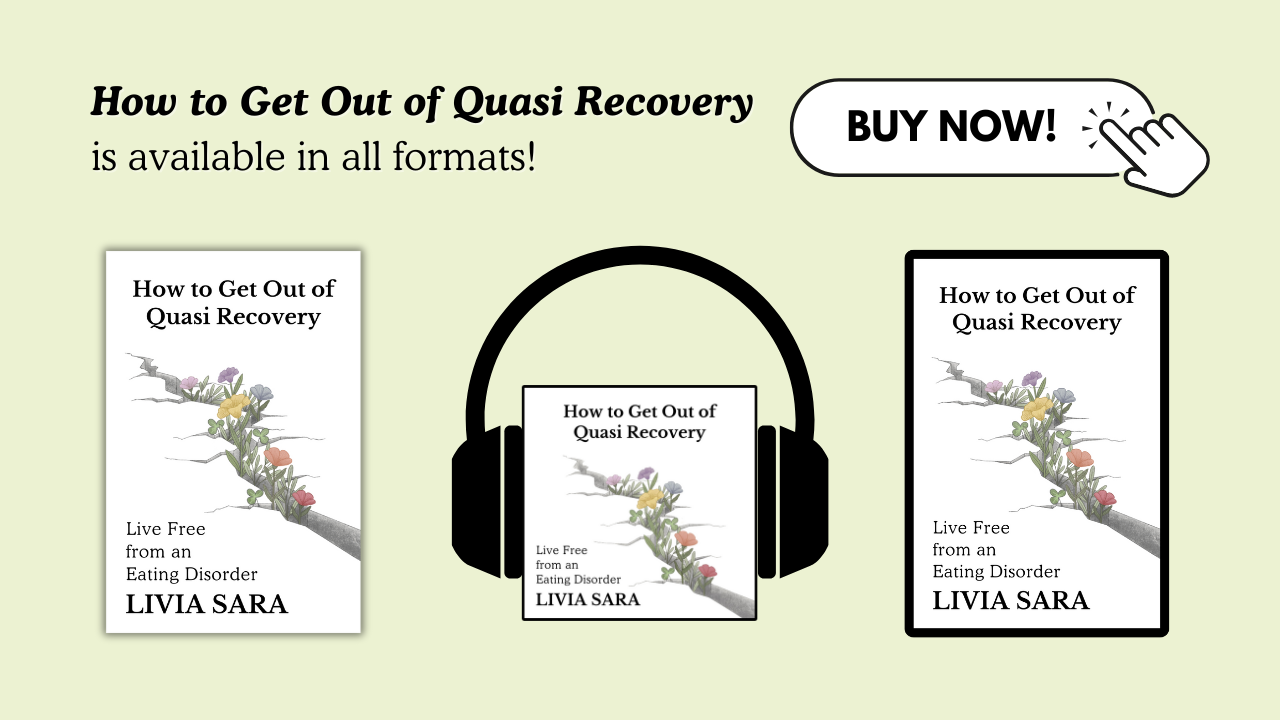Stuck in Quasi Recovery? Practical Tools to Finally Break Free
Jun 24, 2025
The time has finally come: How to Get Out of Quasi Recovery and the accompanying Discovery Workbook are here!
What is Quasi Eating Disorder Recovery?
Quasi recovery fucking sucks. And to be completely honest with you, it’s worse than having an eating disorder. Rather than being fully committed to restriction, exercise, and “perfectly” following the rules of the eating disorder, quasi recovery is trying to get the best of both worlds… but in doing so, you end up in the worst corner of any world.
You don’t want mental hunger. You want to be able to eat whatever you want whenever you want, but of course you don’t want to gain “too much” weight, feel too uncomfortable, or God forbid, develop diabetes or other health issues! Because all you really want to eat is high-calorie “junk” food. This is why you feel you need to follow external rules – because you can’t trust yourself, right?
The same goes for exercise. You don’t want exercise to feel like a chore, you want to experience what they call “joyful movement,” you want to be okay with resting. But, once again, you don’t trust yourself. Because what if taking a break from exercise leads you to become unhealthy or lose all motivation to exercise ever again?
All in all, you just don’t want this constant battle in your head anymore! You don’t want these constant thoughts telling you you’re not good enough. You’re sick and tired of this constant searching for the “right” way to recover. You just want to be free from all of this (free from the eating disorder, but also from the recovery identity), and deep down, the super wise part of you that operates on a dimension far beyond logical comprehension knows that you have what it takes to achieve that freedom.
But…You’re scared. And your fear is valid. It’s the fear of change, opportunity, and perhaps failure. You tell yourself you’ve tried to recover before and failed, so why should you try again? Besides, what will replace your eating disorder once you fully commit to discovery? What if you’re more miserable afterwards? What if it’s too late for you anyways?
The First Book on How to Get Out of Quasi Recovery
It goes without saying that writing an entire book is a huge commitment in and of itself, so it has to be fully aligned with my being to dedicate my time and energy to the process starting at what Anne Lamott calls a “shitty first draft” to a published book in multiple formats – because yes, How to Get Out of Quasi Recovery is available as an ebook, paperback, and audiobook, narrated by me of course!
So what is my writing process and how does this process parallel the process of discovering your true self after an eating disorder? Well, when I commit to writing a book, I do it because my entire being – my soul, so to speak – is being pulled to the page. When I started writing How to Get Out of Quasi Recovery in February of 2024, my being was being pulled to materialize the explosion of emotions and thoughts and ideas I had about quasi recovery because I wanted you – the person that I once was, the person that’s living in fear and looking for a way out of the prison that is quasi recovery – to find freedom.
Note my word choice here: I don’t want you to “know recovery is possible!” or any shallow statements like that, because the truth is, you don’t know recovery is possible for you. How can you? You’ve never experienced it before.
Eating Disorder Recovery Has No Guarantees
Knowledge, by definition, is something that has already happened. The only reason you know how to read is because you’ve read before. Imagine telling a child that they can only start reading once they know how to read! Excuse the silly example but I do hope you “get” where I’m getting at. The only way you learned how to read was by putting one foot in front of the other, or in this case, going word by word.
In the case of finding freedom from an ED, of course you don’t know if the mental hunger will go away. Of course you don’t know if you can handle the responsibilities that come with being healthy. Of course you don’t know if you’ll truly be happier when the ED story is finally behind you.
Again, this isn’t because freedom isn’t possible, but it’s because, as I just alluded to, knowledge comes after experience. What this means is that you will only know what it’s like to be fully recovered when you first claim the permission to discover a fully recovered life.
Eating Disorder Recovery vs. Discovery
I use the word “discovery” very intentionally – because this isn’t about following in someone else’s footsteps. This isn’t about matching your life up to some YouTuber who claims to be recovered or some Instagram influencer that’s all about intuitive eating. True freedom emerges when you stop trying to look for the map, and instead, you open yourself up to discovering your unique version of fully recovered. Your unique version of food, body, and movement freedom.
Of course, it’s working without a map that causes people to enter the land of quasi recovery in the first place. You want evidence, proof – you want to know that you’re not doing recovery wrong. You want proof that honoring mental hunger won’t lead you to swing to the other side and lead you to develop an even more messed up relationship with food. But here we go again with knowing. Proof is a trap, my friend. Or to put it more eloquently: absence of evidence is not the same as evidence of absence. Let that sink in… In fact, I’m going to repeat the phrase because it’s so powerful: absence of evidence is not the same as evidence of absence.
Stop Reading Others’ Stories and Start Writing Your Own
But if my new book doesn’t give you a map about how to do recovery “right,” well then what is it about? Well, as I said on my recent podcast with Victoria, what often happens is that you get sick and tired of the eating disorder, so you decide to recover. But instead of fully committing to the trust fall, instead of confronting the void of your own potential, instead of tapping into your inner artist and embarking on your own unique path…you look at what other people are doing.
You constantly look for permission slips to eat what you crave. You allow yourself to gain weight, but with a catch. You can only gain weight “the healthy way.” You won’t permit yourself to gain weight “too fast,” and if you do fully honor your mental hunger and it turns into a “binge,” well then you’ve just proven you can’t trust yourself – right?
So, back to restricting the next day to “balance everything out” and to achieve that state of being “perfectly hungry.” Basically, quasi recovery is being halfway committed to freedom while simultaneously building all these walls around how to create that freedom the “right way.” To embark on this journey without copying what people on YouTube or Instagram are doing – well that would just be too much of a trust fall.
But as many of you reading this have experienced first-hand or are experiencing right now, quasi recovery makes you feel trapped all over again, because you’re constantly second-guessing your recovery rather than doing the work that actually makes a difference. This is the work of learning to trust yourself, and instead of waiting for permission or searching for it online or in books, How to Get Out of Quasi Recovery teaches you how to claim the permission to create your own life.
It’s not just another eating disorder recovery book filled with the standard recovery advice you already know, because the truth is, advice is useless if you don’t commit to the trust fall. If merely knowing what to do actually made a difference, you wouldn’t still be stuck in recovery.
A Neurodivergent Eating Disorder Recovery Book
What also makes my books unique is that they naturally incorporate the neurodivergent perspective. For me personally, as someone who is autistic and ADHD, my eating disorder was rooted in reasons that were drastically different than for someone who is neurotypical – meaning my discovery journey was also drastically different (and honestly, my entire life now is still drastically different than someone who is neurotypical!).
So rather than telling you to smash the scale or stop counting calories or even to take a break from exercise, How to Get Out of Quasi Recovery invites curiosity. I don’t demonize the eating disorder, I don’t claim it to be a demon that must be fought to the death. I don’t even tell you to face your fears in this book! Instead, I completely turn the tables. I invite you to view the ED not as a disorder, but as a powerful adaptation – an adaptive attempt to solve the existential questioning, an adaptive attempt to conform, an adaptive attempt to make this overwhelming world a little more manageable.
Stop Trying to Overcome Fear in ED Recovery
The typical recovery ultimatum is that you must “overcome” your fears. Supposedly, that’s how you find freedom. But again, my book takes a radically different approach. Instead of viewing fear as your enemy, I teach you how to use fear as your partner. Because the truth is, what we fear most is often what we know in our hearts we most need to do.
Speaking of DOING, that’s where the Discovery Workbook comes in! The reason I created this workbook was because I wanted to create a super practical, hands-on resource that would allow you to turn your insights from the main book into concrete reflection moments of your eating adaptation, and also to give you space to outline your unique path to freedom. Because let’s face it: one person’s way out may actually lead you to feel more lost! So the Discovery Workbook is really here to help you to stop “doing the motions of recovery” and instead, to finally start creating the life you know in your heart you are capable of living.
So, my friend, if you’re tired of being stuck in that frustrating middle ground between your eating disorder and true freedom, and you want an approach that’s unlike anything you’ve ever tried before, these books are for you. You can grab both How to Get Out of Quasi Recovery and the Discovery Workbook at livlabelfreebooks.com.





